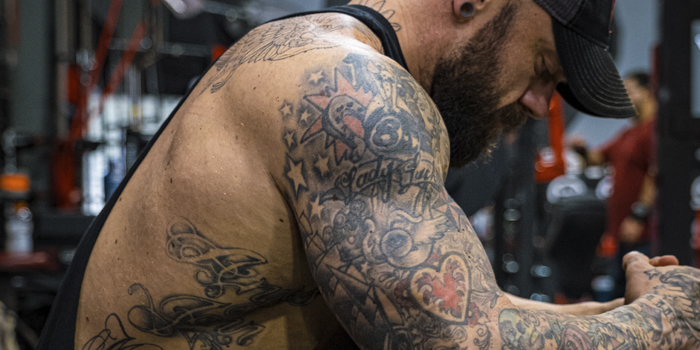
(Hint: It is not the hormones.)
I have mediocre genetics, at best. Of course, everything is relative, so you might think my genetics are better than yours. If you feel this way, your genetics absolutely suck because I know how bad mine are. But what does it really mean when someone says someone else has great genetics for bodybuilding? Most would respond with an answer related to how a physique looks—a visual—and that is only a small part of the equation. There are many variables that cannot be seen or known for years down the road.
I have seen too many physiques turn pro that no one would ever have thought had pro potential. When IntenseMuscle.com was one of the most popular bodybuilding boards in the 2000s, too many members to count ended up turning pro. You would have never seen it coming from a structural standpoint. Some had a good shoulder-to-waist ratio, but no one stood out as having the "IT" factor from a visual perspective.
What is The "IT" Factor?
The ”IT" factor encompasses structural components that make a physique stand out from all other physiques. It is also not necessarily about muscle size because when most people are in their early years of training, the accumulation of muscle size is not there yet.
Here are some structural components of a genetically gifted bodybuilder:
- Wide shoulders/clavicles
- The ability of the scapula to protract and retract more than the average physique
- Good shoulder-to-waist ratio (broad shoulders and a small waist)
- A pleasing shape to all muscle groups (not just one muscle that stands out)
- Carrying body fat relatively evenly from head to toe and front to back (vs. having one area that holds a lot more body fat)
- Not having lagging body parts that are weak in comparison to other muscle groups
Characteristics Are Not THE ONLY Thing You Need
The characteristics listed above are often misleading. You have to have these traits to build or attain an incredible physique, but just as a guy with a beard can have a horrific face (isn't that why beards came back into fashion?), once you build a muscular physique, it is still possible to hide some structural flaws. The question is whether you can grow a beard thick enough to hide or mask major flaws—some can, and some can not. And this leads us to the genetic components we cannot visually assess.
You will never see a pro bodybuilder who does not assimilate nutrients better than the average physique; it will not happen. You will never see a pro bodybuilder who has to diet on 50 grams of carbs to get shredded. Professional physiques have professional digestive systems. It just is not possible to build a lot of muscle without the ability to absorb more nutrients, get those nutrients to the right places (building muscle vs. fat storage), and then have the capacity for those muscle cells to respond to the nutrients.
You will never see a pro bodybuilder who is not stronger than the average physique. They might not train as heavy as possible, instead preferring mechanics over moving big weights, but they have the capacity—at any time—to grab heavy weights and move them. I would go so far as to say that pro physiques rarely train with the maximum pounds they can use while training. Oddly, the rest of us usually do precisely the opposite of that. If the gifted physiques do not need to work at the peak of their genetic strength to grow, how is it that the rest of us think we do? That is right, genetics.
RECENT: When to Train and When NOT to Train
Hormone Use
You will never see a pro respond poorly to hormone use. Some will use a lot of hormones while others will use significantly less, but they both will react very well, or they will not have a pro physique. I understand that most people do not like to admit that some of the more elite bodybuilders do not need the amount of hormone use that less impressive physiques do. Whether you want to argue this or not, it is true. If you argue against this, you have not trained enough pros to know precisely what they are using. If you did, you would not make statements like that.
I get it, though; it is easier to believe that we could be better if we just used more hormones vs. the reality of admitting that our genetics suck and we can not possibly get to the elite level unless we use more hormones. It is self-defeating to be this honest with ourselves. It implies that we may never achieve our dream even after years of chasing it. If I were in that position, I would not want to admit that it is a genetics game, either. The part that people neglect to understand is that mediocre physiques rarely respond significantly better when they use more hormones. Even with the reality slapping them in the face, most will continue to deny it.
The Difference of Recovery
Recovery is rarely something that a great physique struggles with. This is why great physiques can train more frequently. When mere mortals do their workouts, we do not progress very well. If your body is rarely in an overtrained state, progress is typically consistent. Plebeians constantly walk the line of overtraining and usually step over it quite often and have to reset, drop volume and frequency, and, in a sense, start over again.
Good Genetics vs. Not Giving Up
The only way to determine if you have good genetics is to play the hand you were dealt. As far back as twelve years ago, I often have referenced genetic potential as a poker hand. Some are dealt AK suited while others are dealt a two of hearts and a six of clubs. I will take my pair of mop squeezers while I sit on the big blind, and I will play as long as I can. I will maximize my shitty genetics as much as possible because the alternative is to fold my hand and sit at home on my fat ass, eating Doritos and drinking Mountain Dew.
Be realistic with yourself as to why you do not have a pro physique. If it is simply because you have not committed to your training, diet, and supplementation, you are arguably ahead of the rest of us and can flip the switch anytime; you might still have a chance. If you are like the rest of us, you have been doing everything right for as long as you can remember, and there is still no hope of ever having a pro physique. As much as I would prefer to be the lazy or unmotivated former, I am admittedly the realistic latter. I have accepted that I am mediocre. Equally important is that I have accepted that it is all my parents' fault, and I hate them for it—Just Sayin’.
BIO
Ken “Skip” Hill has been involved in the sport of bodybuilding for almost forty years and competing for twenty-plus years. Born and raised in Michigan, he spent 21 years calling Colorado home with his wife and their four children. Four years ago, he and his wife traded the mountains for the beach, relocating to South Florida. His primary focus is nutrition and supplementation, but he is called upon for his years of training experience, as well. He started doing online contest prep in 2001 and is considered one of the original contest prep guys (when the bodybuilding message boards were still in their infancy). Skip’s track record with competitive bodybuilders is well-respected, and he also does sport-specific conditioning, including professional athletes.











2 Comments